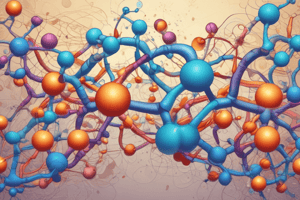Podcast
Questions and Answers
What is the technology used in the study?
What is the technology used in the study?
- An electric current
- Sweat droplets
- A sensor (correct)
- A personalized approach
What is the purpose of the technology?
What is the purpose of the technology?
- To detect changes in body chemistry
- To tailor an ideal drug and dosage
- To monitor medication adherence and drug abuse
- To detect the level of a particular medication (correct)
What is the study's lead author's name?
What is the study's lead author's name?
- Shuyu Lin (correct)
- Emaminejad
- UCLA doctoral student
- Interconnected and Integrated Bioelectronics Lab
What does the technology allow researchers to do?
What does the technology allow researchers to do?
What is the technology a game-changer for?
What is the technology a game-changer for?
What is the study tracking?
What is the study tracking?
What does the technology allow for?
What does the technology allow for?
What is the technology used to detect?
What is the technology used to detect?
What could the technology be used for?
What could the technology be used for?
What could the technology be particularly important for?
What could the technology be particularly important for?
Flashcards are hidden until you start studying
Study Notes
-
A wearable technology that analyzes the chemicals found in sweat could be incorporated into a more personalized approach to medicine—where an ideal drug and dosages can be tailored to an individual.
-
The technology is based on a sensor that detects the level of a particular medication in sweat droplets.
-
The study tracked the effect of acetaminophen on individuals over the period of a few hours.
-
First, the researchers stimulated sweat glands on the wrist by applying a small electric current.
-
This allowed the researchers to detect changes in body chemistry, without needing subjects to work up a sweat.
-
As different drugs each have their own unique electrochemical signature, the sensor can be designed to look for the level of a particular medication at any given time.
-
The study's lead author, Shuyu Lin, a UCLA doctoral student and member of Emaminejad's Interconnected and Integrated Bioelectronics Lab, said the technology is a game-changer and a significant step forward for realizing personalized medicine.
-
The technology can be used to monitor medication adherence and drug abuse.
-
The technology could be particularly important for individuals with mental health issues.
-
The patients could benefit from such easy-to-use, noninvasive monitoring tools, while doctors could see how the medication is doing in the patient.
Studying That Suits You
Use AI to generate personalized quizzes and flashcards to suit your learning preferences.




